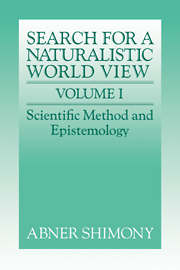Book contents
- Frontmatter
- Contents
- Acknowledgments
- A THE DIALECTIC OF SUBJECT AND OBJECT
- B PERCEPTION AND CONCEPTION
- C EPISTEMIC PROBABILITY
- 6 Coherence and the axioms of confirmation
- 7 An Adamite derivation of the principles of the calculus of probability
- 8 The status of the Principle of Maximum Entropy
- D INDUCTIVE INFERENCE: THE DIALECTIC OF EXPERIENCE AND REASON
- E FACT AND VALUE
- Index
7 - An Adamite derivation of the principles of the calculus of probability
Published online by Cambridge University Press: 21 December 2009
- Frontmatter
- Contents
- Acknowledgments
- A THE DIALECTIC OF SUBJECT AND OBJECT
- B PERCEPTION AND CONCEPTION
- C EPISTEMIC PROBABILITY
- 6 Coherence and the axioms of confirmation
- 7 An Adamite derivation of the principles of the calculus of probability
- 8 The status of the Principle of Maximum Entropy
- D INDUCTIVE INFERENCE: THE DIALECTIC OF EXPERIENCE AND REASON
- E FACT AND VALUE
- Index
Summary
A RECONSTRUCTION OF ADAM'S REASONING
If Adam was a rational man even before he had garnered much experience of the world, and if the ability to reason probabilistically is an essential part of rationality (as Bishop Butler maintained when he wrote that “But, to us, probability is the very guide of life”), then Adam must at least tacitly have known the Principles of the Calculus of Probability. Specifically, Adam must have known that the epistemic concept of probability – probability in the sense of “reasonable degree of belief” – satisfies these Principles, for it is the epistemic concept, rather than the frequency concept or the propensity concept, which enters into rational assessments about uncertain outcomes. But what warrant did Adam have for either an explicit or a tacit assertion that epistemic probability satisfies the Principles of the Calculus of Probability?
Today, the best known and most widely accepted justification of this assertion is the “Dutch Book” Theorem, originally proved independently by F. P. Ramsey and F. DeFinetti for a subjectivist or personalist version of epistemic probability, but applicable also to non-subjectivist or not-entirely-subjectivist versions. It is most implausible, however, to attribute awareness of this theorem to Adam, partly because it requires some mathematics that is not completely trivial, partly because of the rarity of gambling in the Garden of Eden, and partly because in the one case in which Adam did indulge in a gamble he exhibited little skill at decision theory.
- Type
- Chapter
- Information
- The Search for a Naturalistic World View , pp. 151 - 161Publisher: Cambridge University PressPrint publication year: 1993
- 1
- Cited by



